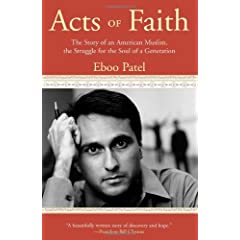May
30
By Andrea Useem, Religion BookLine- Publishers Weekly, 5/30/2007 (reprinted here with permission.)
When most Americans look at Osama bin-Laden, they see a terrorist. Eboo Patel sees that and something more: To him, bin-Laden is a highly effective youth organizer.
“Al Qaeda has a phalanx of people who are focused on shaping the identities of young Muslims toward totalitarianism. Why don’t we have a phalanx of people shaping young Muslims toward pluralism?” asked Patel, a former Rhodes Scholar and executive director of the Interfaith Youth Core, a Chicago-based non-profit that organizes young people of different religions around service projects.
In his new memoir, Acts of Faith: The Story of an American Muslim, the Struggle for the Soul of a Generation (Beacon, July), Patel outlines his personal and intellectual crystallization around the idea of pluralism. “The most profound trend among Muslims in America today is the emergence of a civic Muslim identity based on a religious ethos,” Patel told RBL.
Growing up in the Chicago suburbs, the son of Indian Muslim immigrants, Patel suffered from racist bullying and struggled to find his place as a “brown” minority in America. Patel writes that he was rescued from this identity limbo by a Y.W.C.A. camp, where he was encouraged to serve others and become a leader.
At college, he was drawn to the inspirational legacies of Dorothy Day, Martin Luther King and the Teach for America program, while discovering first hand that working side-by-side with people of different faiths was a great way to establish meaningful connections.
But in his book Patel casts a horrified glance at the story of Hasib Hussain, a shy Londoner who became one of the July 7 suicide bombers. Patel realizes that if radical preachers had reached him instead of the Y.W.C.A. counselors, his own story might have ended much differently.
How then to make pluralism “sexy” in the way jihadists have made totalitarian Islam attractive to young Muslims?
“I try to speak about pluralism in a way that gets deep into the soul. That’s one of the roles I can play: telling stories, starting with my own,” said Patel. Since he founded the Interfaith Youth Core seven years ago, the organization has now involved more than 10,000 young people around the world in its projects. “The goal is to build momentum to attract a large number of people and marginalize the extreme fringes.”
And is that ambitious goal attainable? Answering with optimism and determination, Patel said, “Scientifically, the bumblebee can’t fly. But look, it just flies.”
See also ReligionWriter’s earlier review of Patel’s book.Â
Apr
4
Book: Young Muslim Scholar Sees Violent Extremists as Effective Youth Organizers
April 4, 2007 | 1 Comment
 Acts of Faith: The Story of an American Muslim, the Struggle for the Soul of a Generation (Beacon Press: July, 2007), is the memoir of Eboo Patel, a former
Acts of Faith: The Story of an American Muslim, the Struggle for the Soul of a Generation (Beacon Press: July, 2007), is the memoir of Eboo Patel, a former
Why the Book is Notable: Though many academics have recent titles on American Islam (including Sherman Jackson and Haddad/Smith/Moore), as well as journalists (Paul Barrett, Geneive Abdo and Donna Gehrke White), American Muslims are themselves now filing this market niche, joining the ranks of editor Saleemah Abdul-Ghafur, activist Asra Nomani and, most recently, ex-Muslim Daveed Gartenstein-Ross.
Good Parts: Describing the aspects of himself he saw in the young Muslims who bombed the London transit system in 2005 – anger at Muslim oppression around the world, a taste for risk-taking, an experience of white racism – Patel asks: “How does one ordinary young person’s commitment to a religion turn into a suicide mission and another ordinary young person’s commitment to that same faith become an organization devoted to pluralism?†His answer: Leadership.Young Muslims need visionary leaders who can make sense of modern Muslim identity and mobilize them for a vital cause.
Bad Parts: Patel’s memoir shares the same flaw for which he criticizes other interfaith events: it’s sometimes boring. “We were two twenty-somethings in
Related Content: See journalistic coverage of radicalized youth after the